IPF Webinar on Prevention of Corruption in Public Services
Total Views |
India Policy Foundation Webinar on
‘Prevention of Corruption in Public Services’
June 3, 2023
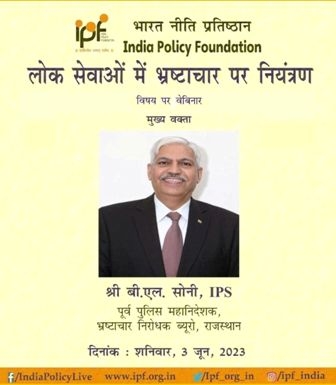
Speaker:
Shri B.L. Soni, IPS (Retd.)
Former DGP, Anti-Corruption Bureau, Rajasthan
Moderator:
Dr Kuldeep Ratnoo
Director, India Policy Foundation
Dr Kuldeep Ratnoo:
Namaskar! I welcome you all to India Policy Foundation’s webinar on “Prevention of Corruption in Public Services.” To speak on this topic, we have with us today, Shri Bhagwan Lal Soni ji, former DGP, Rajasthan. He has held many important positions throughout his career. He retired as DGP, Anti-Corruption Bureau, Rajasthan on 31 December 2022.
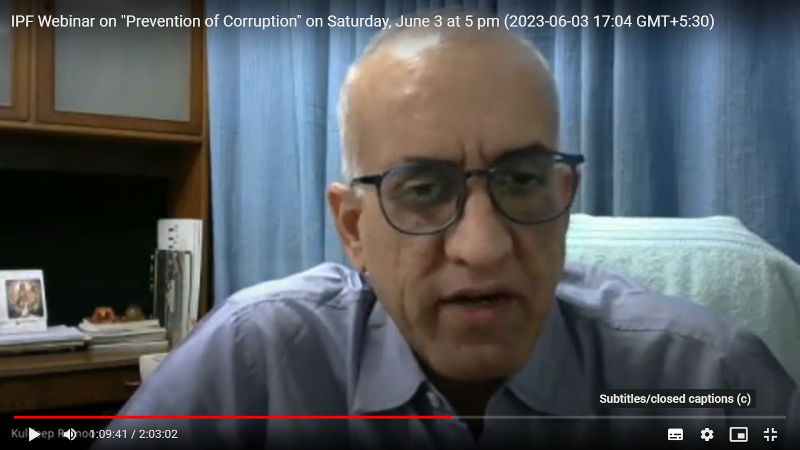
He hails from the village of Kharia Khangar in Jodhpur, Rajasthan. He did his primary schooling from his village, after which he moved to Jodhpur and joined Shri Mahesh Sikshan Sansthan, from where he completed higher secondary. He did his graduation in Agricultural Sciences and post-graduation in Agronomy and was a gold medallist in both the courses. He is a 1988 batch IPS officer. He became an officer at the young age of 25 years. During his long tenure, he has served in various capacities in Rajasthan. He was also on deputation with CBI for five years in Chandigarh.
He has been applauded for his work related to anti-terrorism as well as anti-corruption. He is a recipient of several awards both from the force as well as from the central government. There is a long list of his achievements. But his most notable work was in the last years of service where he was at the forefront of fighting corruption in public services as DGP, Anti-Corruption Bureau, Rajasthan. Today, we would like to know from him, his experiences in the Anti-Corruption Bureau, how people actively came forward to report corruption and also about his various achievements and the challenges he faced.
It is a known fact that India does not have a very good reputation when it comes to its public services. In fact, there are a number of departments that are known to be corrupt like police, transport, revenue etc. It has come to light through various studies that at least 62-65 percent Indians had to deal with an instance of corruption in their lives. 50 per cent Indians are of the opinion that in order to get their work done, either they have to bribe the concerned officials or they have to get a "sifarish" (recommendation) from someone powerful.
When it comes to the pattern of government work that is in practice, I strongly believe that this comes from a colonial mindset. The Britishers had this thought process that since they were in government jobs, they should make as much money as possible, be it in wages, pension or corruption. Since they were the rulers, they felt they had the right to exploit people and extract as much as possible after which they went back to England. The Britishers may have gone back but they left their system behind due to which government servants even to this day think that it is their right to exploit people and extract as much money for their personal comforts. People’s plight does not concern them.
Due to such a mindset and the long years of exploitation, the situation is such that the per capita income of many of the Indian households which belong to the bottom fifty per cent of population stand at Rs 53,000. Whereas a government employee who is in the beginning stage of their career gets a monthly income which is greater than Rs 53,000. The monthly salary that an average government employee gets is more than what half of the nation’s population makes in a year. Despite this, corruption is everywhere.
Today morning, I had a conversation with my domestic help who hails from Bihar. I asked her if she was able to take advantage of any of the government schemes. She said that she was able to avail the scheme which gives housing for those below the poverty line. But before she could get the help of this scheme, she had to pay a government official Rs 12,000 in bribe just to get her papers moving. Even after that, she got only half of the allocated funds released and does not know what happened to the rest. A young girl who is the sole bread winner of her family was made to go through this by the government officials.
So, the question is how do we prevent this corruption? Statistics say that India loses out on five per cent of its GDP due to corruption in public services. Corruption in politics is also at a very high level and its impact is also seen in public services. Even to this date, whatever schemes are being formulated in Delhi, when it percolates to the lower levels, there are high instances of corruption. What I have often noticed in these corrupt officials is that they often argue that big industrialists are also making a lot of money, so why single them out. The one side of reality that these corrupt officials do not see is that the people from whom they demand bribes are not looting the poor and it is their hard-earned money.
Some of these government officials do not even miss the opportunity to exploit street vendors and demand money from them. If their demands are not met, they don’t let them continue their small businesses. How do we put an end to these activities? Government has made some laws and has also established different departments to address the issue. Shri Soni-ji has been part of one such department and we look forward to hearing his experiences while heading that department.
We all are aware that corruption is not a new practice, it has been around for ages. Even Chanakya has mentioned that government officials are like fish in a pond, we will never know how much water they drink. So, it will be difficult to end corruption completely. But we can try our best to control corruption so that the poor are protected and we can ensure development of our nation. For a work that can be done in Rs 100, the government officials spend Rs 500 to make their cut, ignoring the fact that the money for the work is paid for by the taxpayers. How can this be controlled? I request Shri Bhagwan Lal Soni, IPS (Retd.) to share his experiences.
Shri B.L. Soni, IPS (Retd.)
Thank you, Kuldeep ji ! I thank you and your Foundation for giving me this opportunity to speak on this important topic. I will try to explain this issue in simple terms without using any legal jargons for easy understanding.
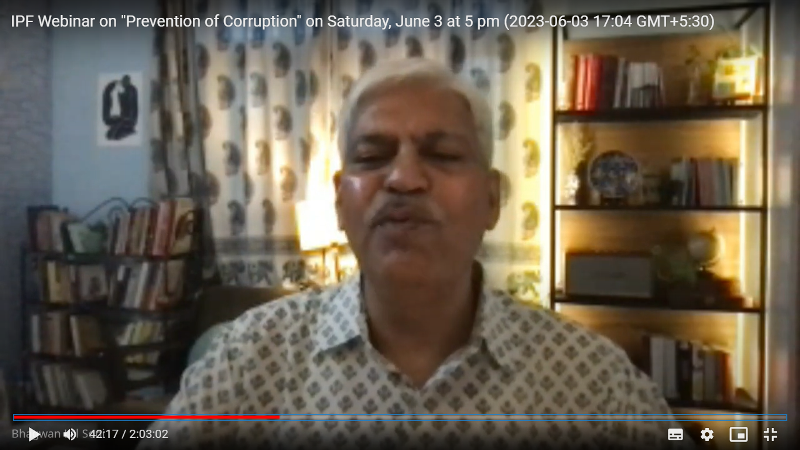
The definition of ‘Lok Sewa’ or public services, is given in the Prevention of Corruption Act. If a person receives any kind of remuneration or facilities from the central or state government for the performance of a public duty, whether that person is elected, nominated or appointed is considered to be a public servant. The issue of corruption has multiple facets and effects. For example, our income should have been Rs 100 crore but our mechanism for collection is such that we are able to collect only between Rs 65-70 crore. We may need Rs 100 crore for the development of our roads, schools etc. but the truth is that we have only around Rs 70 crores at our disposal. Another facet is that if there are 100 deserving candidates, only 70 of them get selected and the rest 30 lose out because others candidates who came through recommendation replaced them.
Corruption has multiple effects. It has parallel economy and parallel administration. It has reached a stage where bribes are being demanded on a daily basis. The departments fighting corruption have only limited scope. Now that I look at the issue through the eyes of a common man, I can see how widespread this is. The biggest challenge that we have to face due to corruption is that it is eroding the credibility of our institutions. Today, even if important people make some observations, people refuse to believe them thinking that they are speaking with a hidden motive. You are all aware of how widespread corruption is in all our daily lives. I will concentrate on the measures that have been taken and can be taken to control corruption and the challenges that are present.
First, I would like to directly get into prevention of corruption in public services. It has to be mentioned that the process of controlling corruption in public services is very complicated. If I am a villager who is in need of a domicile certificate for employment purposes, then the process has to be simple for me to do it on my own. There has to be a board in which it is written that I need to submit my ration card, Aadhar card and letter attested by the sarpanch stating that I reside in that particular ward of the village. If this process is simplified, then the delivery of goods and services can be made seamless. But we have made our processes so complicated, be it any government office we go to. It has come to light that wherever the processes have been simplified, the scope and instances of corruption have seen a decline.
Another factor that can control corruption drastically is the use of technology. Take the case of railway reservations where earlier we had to stand in line for hours together and even pay separately for berths. Once the process became online, people got tickets immediately and it is an example of technology being put to good use. It is the same with pan cards too. The whole process is online and we no longer have to interact with any agent for getting this done.
The third point I would like to make is the importance of transparency. If anyone wants to do anything, it should not be done secretively. It should be done openly for everyone to see. Only information related to national security should be kept a secret. The common people should have access to all other information relating to the delivery of public services. It should be equal for all.
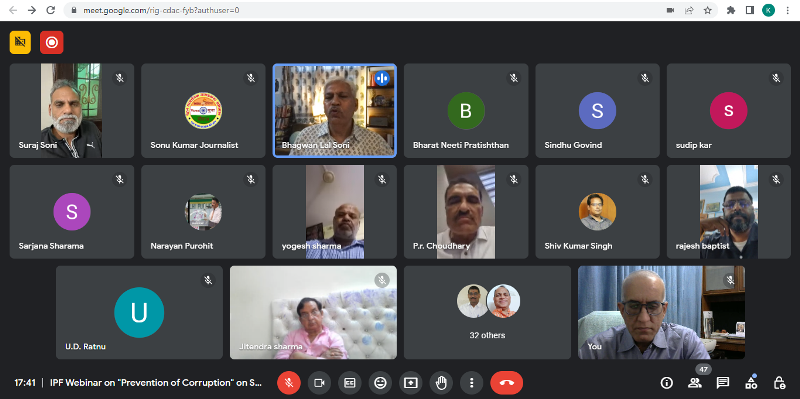
Yet another factor hindering the delivery of public services is that most of the citizens are not aware of the laws. This ignorance is taken advantage of by corrupt officials. I have come across a case where a layperson came to me saying that a police officer was demanding Rs 50,000 to carry out the investigation. When I prodded this layperson further, I realised that he was under the impression that the money demanded was the fee for carrying out the investigation and he never realised that it was in fact a bribe. He thought that it was a common practice to pay high-ranking officers a fee. So, it is important to make people aware that different branches of the government exist to serve the needs of the citizens and for rendering these services, the officials are paid salaries by the government. Public awareness is extremely less when it comes to this.
One of the activities that I was part of during my tenure is that we tried to spread public awareness on this issue. It is important for the public to understand that they have the right to public services as the citizens of this country. They also need to be aware of the laws that will help them get access to these services. A domicile certificate is the right of every citizen and the government official is not bestowing any favour on them by issuing the certificate, but is only doing their work. There should also be clear guidelines on who is eligible to be beneficiaries of a particular scheme. Also, our governance, instead of being individual-based, should be system-based.
Now, there is a debate over the creation of more districts. I will not go into the merits and demerits of it. But we need to think about the resources that have to be spent in creating such rudimentary structures. Our resources are limited. So, it may not be wise to keep on creating more infrastructure to accommodate the district-level offices and hundreds of officials. Have you ever heard of a district-level or village-level office of Google? And the services of Google are something that we use on a daily basis. We should also streamline the delivery of public services in a similar manner. We should have access to our ids which would ensure that there is no misuse of services.
Being from a village, I can say with certainty that till the time officials at the village level are not empowered and given the authority to take decisions, the delivery of public services will continue to only trickle down from the top and will not reach everyone equally. So, we need to concentrate on basic units of governance – gram panchayat and municipal wards. We need to centre the delivery of goods and services around these units as they are at the last end. They are aware of all the factors and it will be difficult for them to employ corrupt practices at this level.
Next, if we deny any goods and services to a citizen, then they have the right to know the reasons for the rejection. It is the duty of the government officials to let them know why they were not eligible for a particular scheme or facility. Another point I would like to make is if any citizen puts in an application for any public services in any of the government offices or portals, the officials sitting in those offices should be sensitive and patient enough to vet those applications and see if they are complete. This would help in the future where the applicants do not find themselves bribing the officials to accept their incomplete applications.
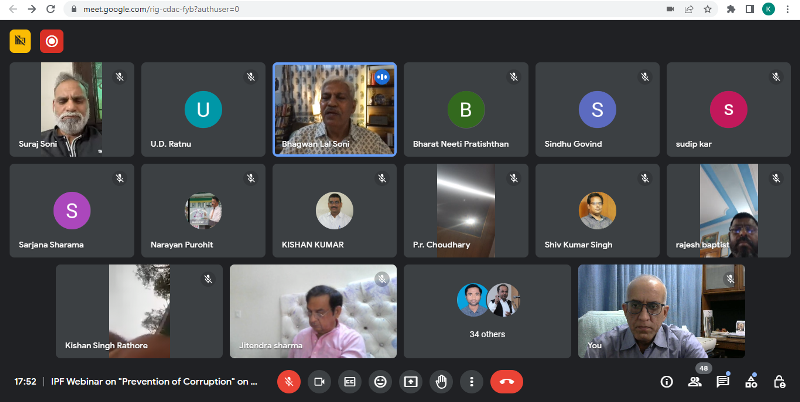
There should also be timelines in the SoPs where the public is aware that they will get a reply in a fixed duration. I have seen it a number of times where it was difficult to get a file moved between the police headquarters and secretariat. I had once jokingly told my superior that even though the distance between both our offices were less than half a kilometer, it would take more than 35 days for a file to be signed. Corruption is the highest wherever there is a delay. Often, no decision is taken on the applications filed by our citizens.
When it comes to public servants, my view is that when a person enters a service, they are willing to do any work even for lesser wages. But after two years, when their probation period is over and they are made permanent, a change in attitude becomes visible. So, it is important that we appoint sincere and honest officials in charge of the induction process. I do not want to get into the merits of anything but in Rajasthan, in the recruitment boards at the state-level, recently a member was arrested for demanding a bribe of Rs 50 lakh. Because of this, the public is looking at all the boards with suspicion. So, while recruiting a public servant who will be in service for the next 30-35 years, if you put barriers at the entry gate itself, that person will keep continuing the corrupt practices that he/she had to face while entering the service.
We must ensure that only the best and honest officials are appointed at the entry gate. It is not that India does not have any honest officials, the problem is with our HR or placement policies. From the lowest to the highest ranks, they are many officers who are nationalistic. We need to brief them correctly and put them in responsible positions. If this is done, they will be able to deliver in an efficient manner. We need to keep in mind the long-term implications while appointing members to the recruitment boards, be it public service commissions, SSC etc. Otherwise, our institutions will be faced with issues of credibility.
The next measure that needs to be taken is to give regular orientation classes to the government officials. They have to be sensitised about the difficulties faced by the public. They do not have jobs. As Kuldeep ji mentioned, half the country’s population earns an annual income of Rs 53,000 which is equivalent to the monthly salary of a junior government official. I have done an experiment and I have come to the conclusion that newly inducted officers should be given training every day for four hours in the most downtrodden places of a city. The casualty wards of hospitals and jails are the places they should be taken to for training. This is my personal opinion.
It is also important to conduct random checking of officers. There should also be rotation of officers. Disclosure of personal interests should also be made mandatory for all the officers. If someone is employed in a government office and if a tender is floated, then it is important for that person to disclose whether the bidder has any relation to him/her. One of the biggest accusations that are levelled against MLAs is that most of the contracts awarded in their constituencies go to their relatives. A cursory examination would reveal that this is true in 80 per cent of the cases. This situation is wrong and should not happen. So, it is important for those public servants in top positions to disclose that the contracts awarded under them have not gone to anyone associated with them in any personal capacity. And in cases where the bidders are known to the officials, they should recuse themselves from the decision-making process.
It is also necessary to have a mechanism in place to keep a watch on public servants. When I was in ACB, unfortunately it came to our notice that one of our own officers at the district level was involved in corrupt activities and we had to arrest him. Those in sensitive posts who directly deal with the public, be it in collection of income or expenditure for development or recruitment, should be brought under surveillance as the credibility of the institutions are at stake. Their lavish lifestyle, disproportionate assets should be looked into.
From the vigilance angle, one of the root causes of corruption is what we call the undesired middlemen or contact persons. They try to liaison with government officials and lure them with gifts and hampers. They are the biggest threat in the fight against corruption. If we put a system in place to ban the entry of these people and stop them from meeting government officials, we will be able to save a big share of the revenue. There are effective laws made by the Central Vigilance Commission for this but the problem is with the implementation.
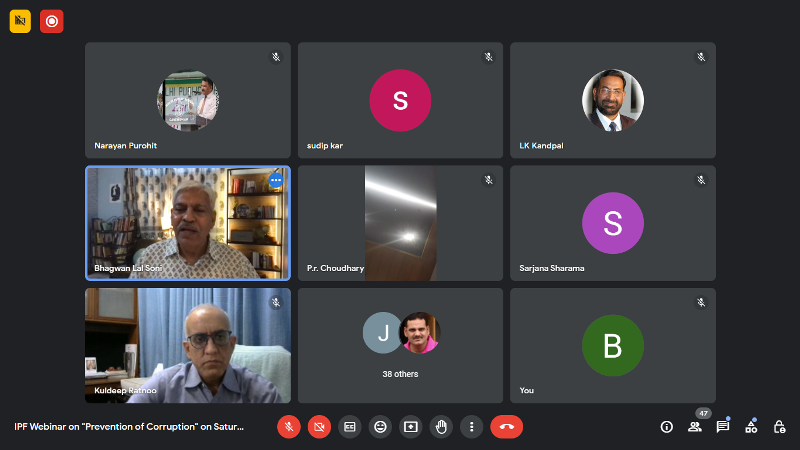
Now, I will come to the anti-corruption law which is the Prevention of Corruption Act, 1988. This Act has been amended from time to time. The last amendment was made in 2018. In this Act, corruption is defined as taking undue advantage in cash, kind or favour. There was a case where a government official had demanded sexual favours from a woman and later, he was arrested for this. Second is abuse of official position. If an official demands any favours for himself or for others which imposes costs on the public exchequer, it is considered misuse of official position. The third is amassing disproportionate assets which is an offence under Section 13.
To monitor this, there is CBI at the central level and anti-corruption agencies at the state-level like Lokpal, Lok Aayukta etc. The government has given these agencies varying degrees of freedom. Some require permission from higher authorities to enquire into a complaint while others are free to initiate an enquiry on their own. We need to increase their trust and credibility by giving them more freedom and by pro-actively engaging them in the fight against corruption. Only then will we be able to put an effective control over corruption.
Many of the states have a zero-tolerance policy but my experience is that this policy is merely on paper and the real situation is something else. What is important is that people should be aware about the existence of these anti-corruption agencies. If a bribe is demanded from the public for delivery of any of the public services, they should be aware that such an anti-corruption agency exists and they can go to them with their problems. The duty of the public servants is to serve the people and this awareness should be there.
Second, any communication with this agency should be made hassle free. We had run this program called ACB Aapke Dwaar which had put in place helplines through landline, mobile and WhatsApp. These were 24*7 helplines which enabled people to report corruption in any department. Initially we received around 10-20 calls a day but with time, the number shot up to almost 400 calls every day. It is not that these calls directly convert to arrests but we get an idea about the health of the system. It helped the anti-corruption agency to make its presence felt in the very last village. We made sure that we worked with the people and looked into the complaints filed. So, it is important to have hassle free contact using phone, e-mails or social media.
It is also equally important to ensure that the response is prompt. If somebody calls you and tells that the SDM has demanded a bribe of Rs 50,000 from you and if you don’t respond immediately, the complainant will feel that all the personnel are hand-in-glove with each other. You will be able to gain their trust only if you respond immediately. A team should immediately go and meet the complainant to understand the issue and take necessary action. The demand should be verified and recorded. There are many tapping and bugging devices now which we make use of to verify the accusations. In addition to this, we also made promotion materials like memes, posters, small clips etc. to make people aware that they don’t have to spend their hard-earned money in bribing people and can instead come to us whenever an official demands a bribe.
Another interesting issue that is often seen within the department is how when someone wants to report the SDM for corruption, his friends and acquaintances dissuade him saying that he will have to face consequences. So, to maintain the credibility of the institution, it is important to follow up on every pending matter. We need to ensure that the work of whistleblowers do not get held up and for this, we have to continuously coordinate with the head of the departments to ensure that the files are cleared in a seamless manner.
Once the case reaches the court, legal support is important. After we get all the papers ready and the case is in court, it becomes a no-man’s land. We are not in touch with the prosecution and there have been times when we got to know that we failed in one of our biggest cases. The trail machinery is far from satisfactory. I consider this among one of the biggest challenges that I had to face. Despite making a strong casefile, the case drags on for years and we have no control over how it is presented in the court. During this period, it becomes possible to influence the witnesses which weakens the case. This an area where a lot of work needs to be done.
We need to have witness protection in place. I had arrested a lot of hardened criminals during my tenure. It is my personal experience that none of criminals hold a grudge against the police force as they feel that we are doing our jobs. But when we arrest a top official on charges of corruption after having sufficient evidence to support our case, he holds grudges for years in his mind. We have had very little work on witness protection in our country and we need to focus on this area. These were the major points I wanted to make on anti-corruption.
We also need the government to take certain measures. Firstly, the government should give reasonable amount of freedom to the anti-corruption agencies. There is a misconception that if someone is reported for corruption, then the higher officials will get upset with the whistleblower. This is a misunderstanding which has to be eliminated with the help of organisations like the India Policy Foundation and others. Even if higher officials get upset, what is more important is to understand the fact that this corrupt official would go on demanding bribes from hundreds of people. By getting him arrested, you are giving justice to those hundreds of people.
In the 2018 amendment, Section 17 A was added in the Prevention of Corruption Act by which if a complaint came to us regarding abuse of power, we could not register a case and initiate an investigation without getting the prior approval of the concerned officer. This is a limitation on our power. Nowadays, RTI become a powerful tool to fight corruption. People pinpoint issues like discrepancies in recruitment, corruption in infrastructure development etc. and send it to us. But we do not have the power to act on these complaints, so we forward it to the concerned officials in the competent authorities like district collector. In most of the cases, we directly send the complaints to the state government under Section 17A.
My experience in these cases is that we mostly do not get permission in these cases. We had forwarded around 500 cases to the state government saying that we have prima facie evidence to prove that corruption has taken place and we need permission to investigate further. But we received the green signal in only 12-15 cases and that too only at the lower level. Permission was always denied to us when it came to higher level officials. So, one of the issues where we would like the government to look into is that of Section 17A.
The next issue where we would like to get the government involved is in the issuance of prosecution sanction. If we catch someone red-handed while accepting a bribe of Rs 1o lakh and we have all the supporting evidence to prove his guilt, then we need to send this information to the competent authority to get prosecution sanction from them. An SP rank officer goes to the government with all the evidence that we have gathered including audio-video evidence, statements of independent witnesses etc. to seek permission to initiate proceedings.
In this, at the lower level, we get prosecution sanction in about 75-80 per cent of the cases. But when it comes to giving permission to prosecute higher officials, there is a lot of hesitation and we get called multiple times to the government offices and we are asked the same questions over and over again. Some of the questions are so vague that it can even dilute the charges. So, this is another area where the government needs to look at from a policy perspective and ensure that sanctions are given within a week’s time whenever a higher-level official is caught red handed. It is true that media has had a huge role to play in ensuring that sanctions are issued. So, when it comes to corruption charges against those officials in the lower rank, we immediately get permission from the collector to initiate proceedings. But when a complaint goes to the Department of Home against higher-ranking officials, we have difficulty in attaining permission and it results in a huge delay.
Third, what anti-corruption agencies need from the government are good prosecutors and good experts like financial experts and cyber experts. The government should also ensure that men and material are provided to these agencies. I have often observed that the other agencies are provided more men and material and the anti-corruption agencies always face a dearth of men and material. Most of the times, we work at 50 per cent vacancies. If the audit is conducted of the resources allocated to the anti-corruption bureau, it will always be ranked the last. These agencies will be able to work more effectively if the government provides them with the necessary resources.
Another area where government intervention is required is in the provisions enabling the confiscation of resources of corrupt officials. But the process is so complicated that officials do not pursue these provisions. To facilitate this process, we need prosecutors which the government should be able to provide us with. If those who engage in corruption become aware that they will be brought to the streets if they get caught, it can act as a deterrent. The government help is also needed in opening special courts so that the corruption cases can be heard on a fast-track basis.
There must also be cells established to analyse the cases where there have been acquittals. The agencies are busy with investigating cases and all their resources are spent on that. So independent agencies are important to understand where the anti-corruption agencies went wrong. And if they find fault with the way the agencies handled cases, then the agencies should be held responsible. This holds true for policing too. If there is political will and an honest and ethical HR policy, a zero-tolerance policy can become a reality. System upgradation and exemplary punishment are equally important.
I strongly believe that the cases that are being reported are only the tip of an iceberg. Otherwise, all of us have a practice of acceptance. Even the most educated person feels that if by bribing an official, if work can be done faster, it is okay to do so as it saves them time and energy. If we have to challenge this acceptance, it is important to first create a culture wherein we go to schools and colleges and educate the younger generation to say no to bribes. For example, if a TTE demands Rs 600 for a berth, then we must be in a position to say no. If people stop giving bribes, then corruption will end on its own.
I will enumerate some of the schemes implemented by ACB, Rajasthan. First is the helpline which I had spoken about earlier. We used to record all the calls and train our personnel to get maximum information from the caller. When callers used to give specific tips, we used to reach at their doorstep through the Aapke Dwaar program. Second, we did public awareness campaigns starting at the district level. We identified platforms where there was scope for corruption and met with the people to make them aware of their rights. With increasing awareness, we arrested many officials for demanding bribes which also included some high-ranking officials. With increasing credibility, more people came forward to report corruption.
Another program that we conducted was Sajag Gram Yojana. We did not have a lot of reach but there was a unit in every district. Every unit adopted three villages. We used to go there every 15 days, met with the villagers and ensured them that we would not allow any officer to demand bribe. We had also given our number to them so that they can report any cases of corruption. We used to talk to the collector and take four or five district-level officers to spread awareness in the villages about the different schemes of the government. We used to encourage the villagers to fill the forms which would enable fast delivery of services. We tried our best to ensure that the real beneficiaries got their work done in the two years we worked with them. However, we did not succeed in this completely. We had our limitations. We got many requests from the nearby villages to start a similar program but we could not do so due to our resource limitations.
Another step we ensured was to do diligent follow-up with the citizens after the arrest of a corrupt official. We made certain that citizens did not suffer in any way due to the arrest and their works were completed in a seamless manner. We also issued a circular from the Chief Secretary’s office which said that whistleblowers will be protected and all help will be provided to them to get their work completed. Next, we instituted a revolving fund. When we take somebody’s help to trap an official, then his money is stuck for long as court cases take time. So, we requested the government to set up a revolving fund from where we could repay the money immediately to the citizen. When the amount was released from the court, the money would go to this fund. This improved the situation a lot.
We also deployed some of our officers for time bound disposal of cases. We gave our officers regular training to sensitise them about the issue. We had CBI officers coming and speaking to them because of which the credibility of the ACB increased and people started coming to us.
There are certain issues which I would like to flag. The first is that we are not having authority on private players in the public services. For example, a few B.Ed students had come to us saying that their institution was demanding a bribe of Rs 50,000 from each student if they wanted to sit in the exam, citing that they did not have the required attendance. This is despite the institution telling them not to come to the college and taking a fee of Rs 3 lakh annually. ACB was able to trap one or two persons in this case but the question was who was going to give prosecution sanction as when it came to private institutions, the power often vested in one person, owning the institution. There are a lot of vendors like this in the public services sector and there is a need to formulate a policy covering them as well.
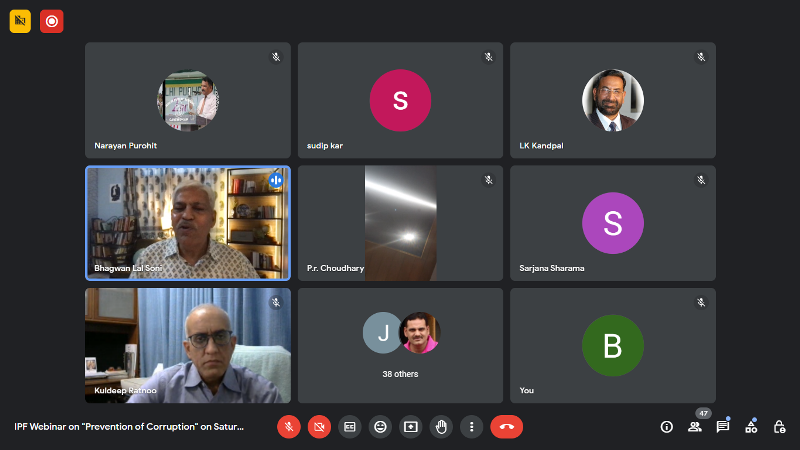
There are numerous other issues which have cropped up in the last 5-10 years. You would have heard about Bajri sand that is used in construction. This has changed the level of corruption in the Rajasthan as there is lot of money involved in this. Land is another aspect that has increased corruption in the state. Also, the challenge in all these cases is the symbiotic relationship that exists. The corrupt official is happy to take the bribe and the citizens are happy to give the bribe. In such cases, how far can the power of ACB be enforced? In the one and half years, ACB tried its best to trap people through surveillance in such cases. We succeeded in catching the guilty in 30 such cases where officials of both the higher and lower levels were involved. But now, everyone has changed their strategies and call on WhatsApp and Facetime. We cannot do any kind of surveillance in such cases. We need to look into the possibilities of having interception at these levels too.
We also need to have an effective control over the role played by undesirable “contact persons”. It is an area where a lot of work needs to be done. We need to create an environment where if a corrupt official walks amongst people, he will be forced to keep his head down. Earlier, honest officials used to get a lot of respect in society. We need to bring back that ethos. We need to look into the court delays and also ensure witness protection as mentioned earlier.
Internal vigilance is an important aspect which is the responsibility of every head of department and every official. It was never the work of CBI, Vigilance or anti-corruption agencies to stop corruption. Their work is restricted to treating the disease of corruption. It is the work of every ministry and head of the department to ensure that there is transparency and accountability. They need to ensure that their officers are honest and also ask questions about why a high-ranking official would demand a bribe.
My personal opinion is that corruption trickles from top to bottom. If you have an honest officer at the top, corruption will not get institutionalised. It is important that in our institutions that have a vision for the next 30-40 years, we appoint officers of known integrity and ethical background. We used to call our officers for a cup of tea and click pictures with them and post it in our WhatsApp groups. This helped a lot in creating a positive image about the anti-corruption department and encouraged many to join. Such small incentives also work. These are the issues that I wanted to cover. Now we can move on to the question-and-answer session.
Q & A session
Dr Kuldeep Ratnoo:
Thank you so much, sir! You spoke about a number of issues in a detailed manner. You spoke about the practical problems and also about the novel initiatives undertaken, especially about the public outreach and its impact. The agencies like CBI are independent but the anti-corruption department at the state level comes under the state police force. The officers appointed are often those who are used to taking bribes from the people. It is not possible to change someone’s character overnight. They also worry about trapping someone with whom they may have to work again once they will get transferred. So, it is important that we have a separate department for vigilance and anti-corruption.
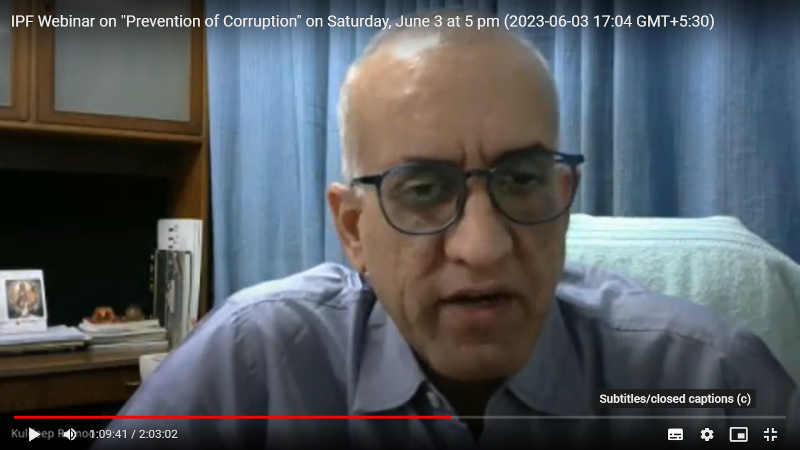
Shri B.L. Soni
My experience is that whenever you make officers permanent in agencies like the CBI, then they start treating it as their legacy and get on with their work. So, we ensure that we only depute officers who are known for their integrity. We have a similar system in the ACB too where we have constituted a board where officers from the home department are there. They thoroughly scrutinise the record of each and every officer and even if there is one red mark, that officer is not appointed. From my 35 years of experience, of which five were in the CBI, I believe that the best way is to appoint honest officers on deputation for four to five years. Unfortunately, some people who were made permanent are the biggest black sheep of our agency.
Dev Ratan Sharma: As you said Section 17A ties the hands of the officers. Prosecution sanction is difficult to obtain. Take the example of the case in Delhi where despite CCTV visuals nailing the accused in a murder, the court said he cannot be held guilty as the murder weapon was not found. Another point I would like to make is that the practice of corruption gets an encouragement the moment we start giving harmless gifts to officials. So, the sensitisation should start from homes where it should be made clear that corruption is a malpractice. As your experience has shown, there are a lot of limitations put on officers to act on corruption cases. The situation gets worse if the higher authorities are corrupt. When it comes to the medical profession, we all know the kickbacks doctors receive yet we do not see them getting prosecuted for corruption. So, somewhere I see these anti-corruption agencies as toothless. The officers are scared of their higher authorities. As you said, we need our old traditions. There is need for dharma. The question remains how to club these two aspects.
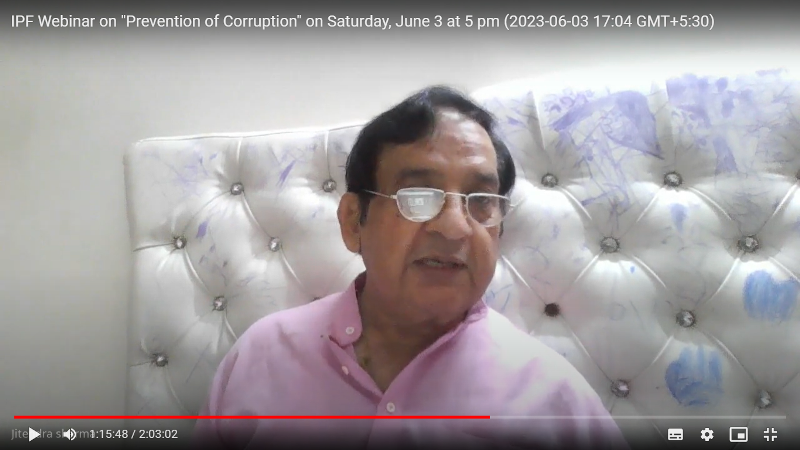
Ashutosh Mishra: I have two questions. You spoke about the 17A amendment. I feel that mega corruption has come to the policy level. With such provisions, we will never be able to stop corruption. So, is the present act sufficient? The second question is, why is there no act in India to address the issue of conflict of interest?
Shri Soni: What you have observed is correct. When Section 17A came into effect, I also felt that a large section of officials who could have been brought under prosecution will now remain protected. The logic behind this section may have been to protect the innocent officers. But the process of attaining permission is so complicated that often there is an unwritten rule that permission should not be granted. We should keep demanding the government to take some measures for strengthening the law. It has to reach Parliament that it is not okay to have 17A in this form.
When it comes to conflict of interest, the Central Vigilance Commission (CVC) has included this provision in their 2020 pamphlet. They issued some directions with regard to Government of India institutions and public sector enterprises. It does not cover the states but this is a good beginning. There was a conference that was held in Kevadia in which the CVC had spoken at length about this issue. I agree with you that legislation is necessary in this case.
Abhinav Pandya: Since this discussion is on corruption, I would like to convey some fundamental aspects. When it comes to public services, there are many cases where high-level officials were caught red-handed demanding bribes. They got arrested but they were reinstated in service with respect and honour. Even those heading ACB have been found to be corrupt. I recall an incident where a village boy who was a gram sevak went on to become an IAS officer and engaged in massive corruption. He is serving to this day. Why does this happen? My argument is that there is no accountability in our public services and officials have a sense of impunity. Corruption is majorly a British legacy. During training, it is often put in the officers’ heads that they are divine. When such a mentality exists, how can we expect people not to indulge in corruption? There are several cases of these bureaucrats rising to the highest ranks even after committing a murder.
Contrary to this, in the Army, officers have to give an exam at every level for promotion. This is not the case when it comes to civil services. The origin of a lot of problems lies in the fact that those preparing for civil services have to undergo extreme pressure and when they emerge victorious, the only thing on their minds is to hold on to this power and also to make as much money as they can. The second question is how do we deal with non-conventional sources of corruption? For example, I was made to run pillar to post for a signature and in the end, I got the signature of the collector only after pressure was put on him by higher authorities. Third, what about the seats that get wasted in government colleges when after getting degree students leave their specialisation and start preparing for civil services? This is taxpayers money that is being wasted.
Moreover, it is not like people are unaware that giving bribes is wrong. But some government officials wilfully delay the process so much that people are left with no choice but to give bribes. Additionally, we have not spoken about incompetence. The solution would be to ensure accountability by continuously checking the track records of the officials and by making them give exams for promotions. Lateral entry system can also be made possible.
Shri Soni: I can say with certainty that all the officers who were caught red-handed are facing trial and they will not be acquitted. Till the time we keep empowering common citizens, more officials will keep getting caught. I think this is a good beginning. We should not get discouraged and keep this fight going. Next, I do agree with your point on accountability. It is true that we have only entry system and do not have an exit system. There is momentum that is being created for lateral entry now. I think the future is good.
Suresh Kumar Bishnoi: Corruption begins from the process leading up to the legislative assembly elections where crores have to be spent. We should make a rule which allows for campaigns to be conducted only through television. This would drastically bring down the costs.
Shri Soni: I completely agree with your observations.
Ranjeet Charan: The work you have done in taking the work of ACB to common citizens is commendable. Our system unfortunately enables corruption. Government officials should always have this fear that they are being constantly monitored by an external agency. Otherwise, they will keep finding ways to indulge in corruption.
Shri Soni: Right now, we are in reactive mode. I agree with you that we have to be in proactive mode. But the laws that we have are such that we cannot act without permissions. We can go into proactive mode only if there is a public outcry. We need to do away with the practice of acceptance.
Ashish Ranjan: Corruption is everywhere but what is happening in Bihar has crossed all limits. How can we prevent corruption with the help of the zero-tolerance policy?
Dr Ratnoo: Soni ji has covered most of the relevant points in his lecture. You will have to look at what is happening in Bihar and employ the solutions suggested today after taking the situation there into consideration.
Shri Soni: I would say that you focus on the two most corrupt officials, encourage two of their victims to give statements and go to your state’s anti-corruption agency. Bihar’s ACB is quite active and is doing good work.
P.R. Choudhary: Should a different cadre be instituted for ACB so that the officers can carry out their work with honesty and integrity? My second question is what happens to contractors who do corruption in public services?
Shri Soni: Permanent postings will always lead to saturation and corruption. So, deputation is always a better choice. There is a process that is in place for those who want to join the ACB. There is board constituted which is headed by the chief secretary. The applications are scrutinised and even if there is one red mark, the officer is not selected. ACB monitors the activities of the higher officials and if there are any suspicious activities, we take further actions.
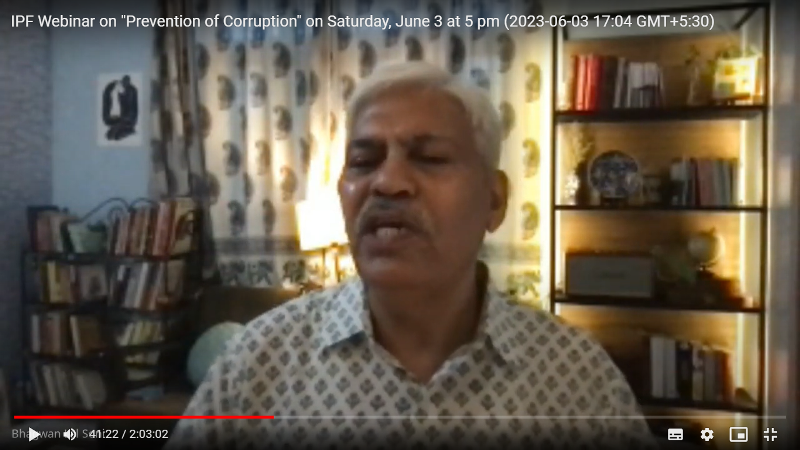
For ensuring the quality of materials, we used to do joint surprise checks. The vigilance and the concerned departments used to join us in these checks. If the materials were found to be of low quality, we had the power to initiate proceedings.
Jagdish Singh: The number of allegedly criminal elements is increasing in our legislatures despite us saying that our democracy is maturing. The root cause of corruption is that in post-colonial India, we have not made laws friendly to our dharma, justice and humanity. We have continued the archaic feudal colonial laws. We need men of integrity in our political commands at the centre and states to scrap them.
Hemant Tak: Officials indulge in corruption mostly owing to political allegiance and the cut goes to the political leader. How should that be addressed?
Dr Ratnoo: All these aspects are there but I believe that when the recruitment process itself encourages corruption, then it becomes a continuing practice. We need a stringent law that would seize the property of the corrupt officials. In addition to this, we should also make the beneficiary of the corruption as accused. If the official’s wife or son is studying in a foreign university and the fees for that is paid for by the income from corruption, then they should also be made co-accused. In cases of theft, if Rs 10 lakh is distributed among four people, then we consider all four as accused, but we do not do the same when it comes to corruption. The moment you make the beneficiaries co-accused, then we will be able to see a drastic change. Till then, the official will feel that even if he has to go to jail, it is fine since his family has got the money. Public needs to put pressure for this.
Jay Soni: Isn’t it difficult to maintain integrity while remaining in the system, balancing professional success and integrity?
Shri Soni: I would say that you should define success in your own way. If you want to reach the highest level, then that success will be at a cost. You should be able to attain success without killing your conscience. You should be able to hold your head high.
About the question regarding our democracy maturing. Could we have imagined a few years back that our self-attested documents will be accepted? We have forward legislations like RTI which has empowered the common man. Proceeds of crime is a very good suggestion and we need to take this to different fora and build momentum.
Lekshmi Parameswaran: We have a Whistleblowers Protection Act but we still do not see people coming forward to expose corruption. What are the gaps in this law and what could be done to address the gaps?
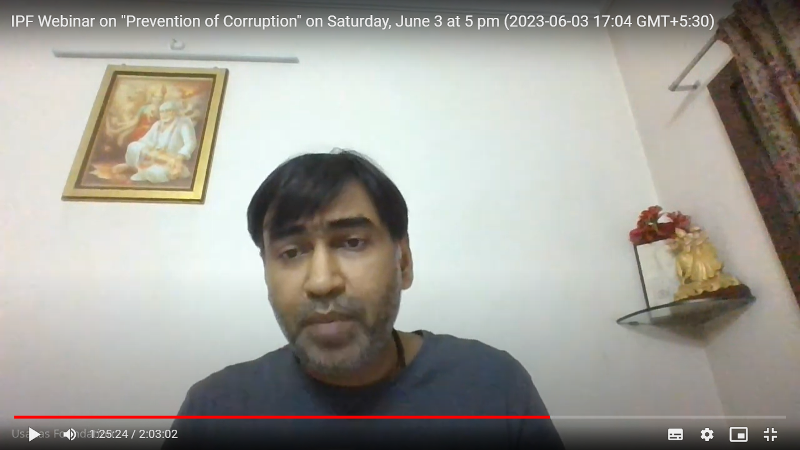
Shri Soni: We do have a Whistleblowers Protection Act. But witness protection is not effective institutionally in our country. In foreign countries, there is a witness protection system in place where it is possible to even change the official id of the whistleblower and they are settled elsewhere. We do not have that. Witness protection is still in a very primitive stage. The wider legislation on it is yet to come. In our country, when witnesses turn hostile despite all supporting evidence, it happens either due to threat or allurement. We need to do brainstorming on how to protect the witness from both threat and allurement. Whistleblowers Protection Act is not a foolproof act but it is a good beginning. We need to do more. To begin with, we can make legislations to protect the witnesses in big cases where high ranking officials were arrested.
Dr Kuldeep Ratnoo:
Thank you so much sir, for giving such a detailed lecture on this topic. You shared your personal experiences and presented a comprehensive picture of the issue. The issue of corruption is such that it troubles everyone. There are times even those who indulge in corruption say that the practice should end. This is a materialistic age where success is measured by the things we own, like the car we drive, house we live in, the jewellery we wear etc. Due to this, people resort to both legal and illegal ways to amass wealth.
Next is, in our concept of dharma, artha, kama, moksha, people are no longer scared of karma. They think that nothing will happen to them and their deeds will have no effect. This has happened due to the weakening of dharma, our value system and also due to the decline of our society. A major reason for this is the impact of Western culture on Indian value systems. Now many believe that there is just one life and it needs to be enjoyed. There is no fear of god or morality in society anymore. It has come down to accumulation of materialistic things and the focus has shifted to physical pleasure. This issue has intellectual aspects as well as dharmic aspects.
Legal aspect will come into the picture only when someone files a complaint. But if we look at the total workforce, then there are crores of government employees in the country. I strongly believe that 75 per cent of them are honest. Out of this 50 per cent may be honest because they did not get any opportunity for corruption, but the rest 25 per cent is honest despite having the opportunity to indulge in corruption. And for the other 25 per cent who indulge in corruption, there are laws to address this. But what is more important is the value system. If we go somewhere and happen to see a Rs 2 coin on the ground, we do not pick it up even if we are alone. This is because of our value system. So, if that value system is there, this issue can be resolved. There should be social awareness and social awakening. Society should start ostracising those who indulge in corruption. Nowadays, we are witnessing a situation where people who are released from jail are given a rousing reception. If a corrupt person donates Rs 5 lakh for a social cause, he is applauded. Nobody questions the source of that money. There is societal tolerance, even acceptance of corruption. The decline of societal values is the major reason behind the increasing corruption in our country.
I thank Shri B. L. Soni ji for agreeing to speak on this important topic in today’s webinar. I also thank all the participants for giving their valuable time and being part of this discussion. Thank you very much!

